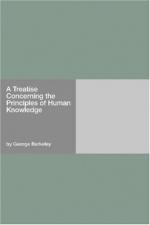100. What it is for a man to be happy, or an object good, every one may think he knows. But to frame an abstract idea of happiness, prescinded from all particular pleasure, or of goodness from everything that is good, this is what few can pretend to. So likewise a man may be just and virtuous without having precise ideas of justice and virtue. The opinion that those and the like words stand for general notions, abstracted from all particular persons and actions, seems to have rendered morality very difficult, and the study thereof of small use to mankind. And in effect the doctrine of abstraction has not a little contributed towards spoiling the most useful parts of knowledge.
101. Of natural philosophy and mathematics.—The two great provinces of speculative science conversant about ideas received from sense, are Natural Philosophy and Mathematics; with regard to each of these I shall make some observations. And first I shall say somewhat of Natural Philosophy. On this subject it is that the sceptics triumph. All that stock of arguments they produce to depreciate our faculties and make mankind appear ignorant and low, are drawn principally from this head, namely, that we are under an invincible blindness as to the true and real nature of things. This they exaggerate, and love to enlarge on. We are miserably bantered, say they, by our senses, and amused only with the outside and show of things. The real essence, the internal qualities and constitution of every the meanest object, is hid from our view; something there is in every drop of water, every grain of sand, which it is beyond the power of human understanding to fathom or comprehend. But, it is evident from what has been shown that all this complaint is groundless, and that we are influenced by false principles to that degree as to mistrust our senses, and think we know nothing of those things which we perfectly comprehend.
102. One great inducement to our pronouncing ourselves ignorant of the nature of things is the current opinion that everything includes within itself the cause of its properties; or that there is in each object an inward essence which is the source whence its discernible qualities flow, and whereon they depend. Some have pretended to account for appearances by occult qualities, but of late they are mostly resolved into mechanical causes, to wit. the figure, motion, weight, and suchlike qualities, of insensible particles; whereas, in truth, there is no other agent or efficient cause than spirit, it being evident that motion, as well as all other ideas, is perfectly inert. See sect. 25. Hence, to endeavour to explain the production of colours or sounds, by figure, motion, magnitude, and the like, must needs be labour in vain. And accordingly we see the attempts of that kind are not at all satisfactory. Which may be said in general of those instances wherein one idea or quality is assigned for the cause of another. I need not say how many hypotheses and speculations are left out, and how much the study of nature is abridged by this doctrine.




